最新高中英语必修一第一单元重点词汇及语法
人教版高中英语必修一 重点短语、语法知识点总结
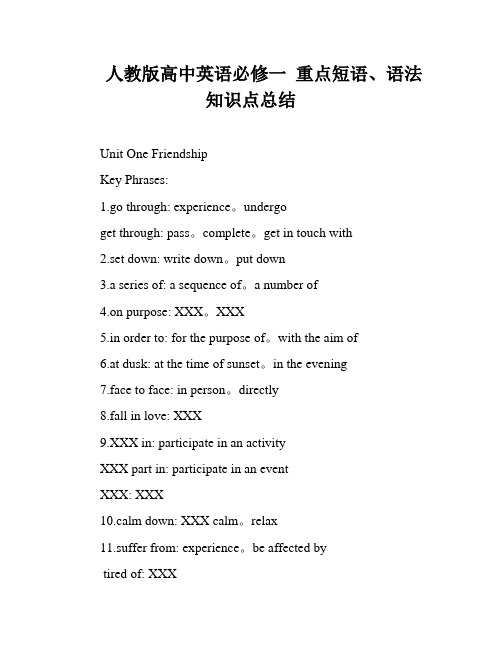
人教版高中英语必修一重点短语、语法知识点总结Unit One FriendshipKey Phrases:1.go through: experience。
undergoget through: pass。
complete。
get in touch with2.set down: write down。
put down3.a series of: a sequence of。
a number of4.on purpose: XXX。
XXX5.in order to: for the purpose of。
with the aim of6.at dusk: at the time of sunset。
in the evening7.face to face: in person。
directly8.fall in love: XXX9.XXX in: participate in an activityXXX part in: participate in an eventXXX: XXX10.calm down: XXX calm。
relax11.suffer from: experience。
be affected bytired of: XXX13.be concerned about: care about。
worry about14.get on/along well with: have a good nship with15.be good at/do well in: be skilled at。
excel in16.find it + adj。
to do sth.: consider doing something to be。
17.XXX: not anymore18.too much: an excessive amount (used with uncountable nouns)much too: excessively (used with adjectives)19.not…until: only after。
高中英语必修一第一单元知识点

高中英语必修一第一单元知识点一、词汇与短语1. 词汇- 基础词汇:问候、介绍、数字、颜色、职业、日常用品等。
- 扩展词汇:描述人物特征、表达喜好、日常活动相关词汇。
2. 短语- 问候用语:Hello, Hi, Good morning/afternoon/evening.- 自我介绍:My name is..., I come from..., I am...- 询问与回答:What's your name?, How old are you?, Where do you come from?- 表达喜好:I like/don't like..., I'm interested in..., My favorite...二、语法1. 时态- 一般现在时:表示经常发生的动作或状态。
- 一般过去时:表示过去发生的动作或状态。
2. 句型- 肯定句、否定句和疑问句的构成。
- 特殊疑问句的构成:Who, What, Where, When, Why, How。
3. 代词- 人称代词主格和宾格的使用。
- 物主代词形容词性和名词性的区别。
4. 介词- 常用介词:in, on, at, for, with, by, of, about, from, to, from...to...三、听力与口语1. 听力- 理解日常对话和短文。
- 抓住关键信息,如人名、地点、时间和数字。
2. 口语- 进行简单的自我介绍和日常对话。
- 描述人物和事物,表达个人意见和喜好。
四、阅读与写作1. 阅读- 阅读并理解简短的文章和对话。
- 通过上下文猜测生词的意思。
2. 写作- 写简短的自我介绍。
- 描述人物、地点或事件。
五、文化知识1. 了解英语国家的基本文化习俗。
2. 学习与日常生活相关的英语国家节日和传统。
六、学习策略1. 制定学习计划,合理安排学习时间。
2. 利用多种资源和工具辅助学习,如词典、录音和在线资源。
新教材 人教版高中英语必修第一册全册各单元知识点提炼汇总(单词短语语法写作等)
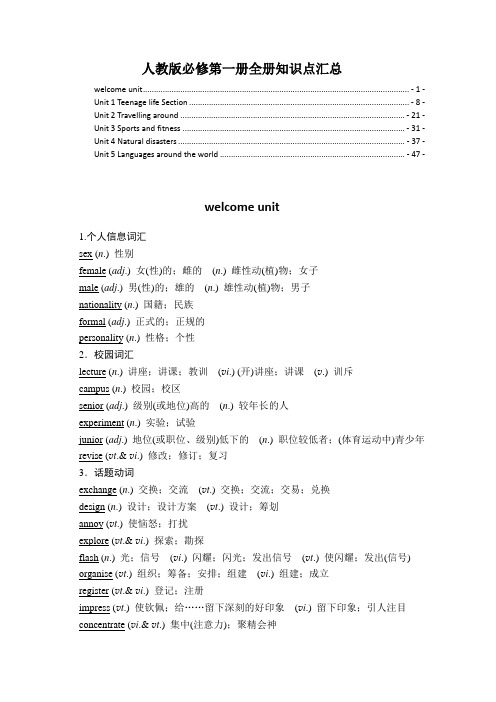
人教版必修第一册全册知识点汇总welcome unit ......................................................................................................................... - 1 - Unit 1 Teenage life Section .................................................................................................... - 8 - Unit 2 Travelling around ...................................................................................................... - 21 - Unit 3 Sports and fitness ..................................................................................................... - 31 - Unit 4 Natural disasters ....................................................................................................... - 37 - Unit 5 Languages around the world .................................................................................... - 47 -welcome unit1.个人信息词汇sex (n.) 性别female (adj.) 女(性)的;雌的(n.) 雌性动(植)物;女子male (adj.) 男(性)的;雄的(n.) 雄性动(植)物;男子nationality (n.) 国籍;民族formal (adj.) 正式的;正规的personality (n.) 性格;个性2.校园词汇lecture (n.) 讲座;讲课;教训(v i.) (开)讲座;讲课(v.) 训斥campus (n.) 校园;校区senior (adj.) 级别(或地位)高的(n.) 较年长的人experiment (n.) 实验;试验junior (adj.) 地位(或职位、级别)低下的(n.) 职位较低者;(体育运动中)青少年revise (v t.& v i.) 修改;修订;复习3.话题动词exchange (n.) 交换;交流(v t.) 交换;交流;交易;兑换design (n.) 设计;设计方案(v t.) 设计;筹划annoy (v t.) 使恼怒;打扰explore (v t.& v i.) 探索;勘探flash (n.) 光;信号(v i.) 闪耀;闪光;发出信号(v t.) 使闪耀;发出(信号) organise (v t.) 组织;筹备;安排;组建(v i.) 组建;成立register (v t.& v i.) 登记;注册impress (v t.) 使钦佩;给……留下深刻的好印象(v i.) 留下印象;引人注目concentrate (v i.& v t.) 集中(注意力);聚精会神improve (v i.& v t.) 改进;改善4.话题描述性词汇anxious (adj.) 焦虑的;不安的annoyed (adj.) 恼怒的;生气的frightened (adj.) 惊吓的;害怕的outgoing (adj.) 爱交际的;外向的awkward (adj.) 令人尴尬的;难对付的confident (adj.) 自信的;有把握的curious (adj.) 好奇的;求知欲强的forward (ad v.) (also forwards) 向前;前进(adj.) 向前的;前进的5.话题名词registration (n.) 登记;注册;挂号nation (n.) 国家;民族;国民designer (n.) 设计者impression (n.) 印象;感想confidence (n.) 信心;信任guy (n.) 小伙子;男人;家伙organisation (n.) 组织;团体;机构goal (n.) 目标;球门;射门strategy (n.) 策略;策划partner (n.) 同伴;配偶;合伙人company (n.) 公司;商行;陪伴style (n.) 方式;作风6.话题短语senior_high_school 〈美〉高中at_last 终于;最终make_an_impression 留下好印象what_if 要是……会怎么样呢concentrate_on 集中精力于leave ... alone 不打扰;不惊动junior_high_school 〈美〉初级中学look_forward_to 盼望,期待take_notes 记笔记flash_card 教学卡片;识字卡重点知识合作探究Our school invited two engineers to design_a_language_lab_for_us.我们学校邀请了两位工程师为我们设计一个语言实验室。
高一英语上册第一单元笔记

高一英语上册第一单元笔记一、重点单词。
1. survey.- n. 调查;民意调查。
例如:A recent survey shows that most students prefer to study in groups.(最近的一项调查显示大多数学生更喜欢小组学习。
)- vt. 查看;审察;审察(建筑物等)。
例如:They surveyed the building carefully before buying it.(在购买之前他们仔细查看了这栋建筑物。
)2. add.- vt. 增加;添加;补充说。
例如:Add some salt to the soup.(往汤里加些盐。
)“I'm sorry,” she added.(“对不起,”她补充说道。
)- vi. (to)增添。
例如:His illness added to the family's trouble.(他的病给家庭增添了麻烦。
)3. point.- n.- 要点;论点;观点。
例如:What's your point?(你的观点是什么?)- 点;小数点。
例如:The temperature is 36.5 degrees.(温度是36.5度,这里的“.”是小数点)- 分数;成绩。
例如:He got a high point in the exam.(他在考试中得了高分。
)- 尖端;尖儿。
例如:the point of a pen(笔尖)- vi. (at/to)指;指向。
例如:He pointed at the map.(他指着地图。
)- vt. 指出。
例如:The teacher pointed out my mistakes.(老师指出了我的错误。
)4. upset.- adj. 心烦意乱的;不安的;不适的。
例如:She was upset about losing her wallet.(她因为丢了钱包而心烦意乱。
(完整版)人教版高中英语必修一语法知识点总结
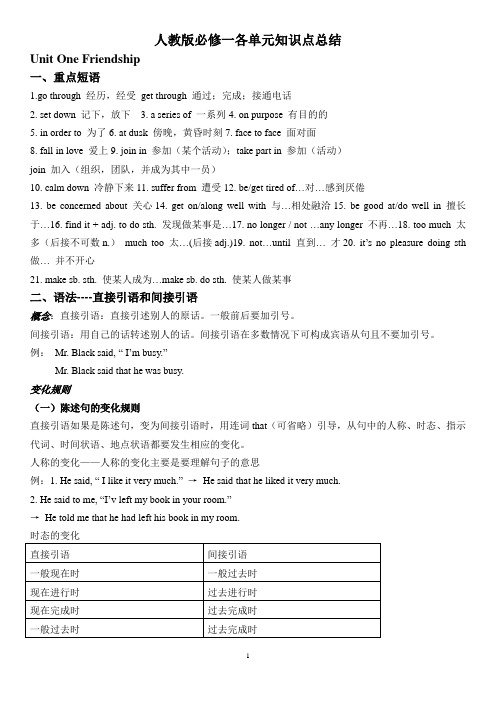
人教版必修一各单元知识点总结Unit One Friendship一、重点短语1.go through 经历,经受get through 通过;完成;接通电话2. set down 记下,放下3. a series of 一系列4. on purpose 有目的的5. in order to 为了6. at dusk 傍晚,黄昏时刻7. face to face 面对面8. fall in love 爱上9. join in 参加(某个活动);take part in 参加(活动)join 加入(组织,团队,并成为其中一员)10. calm down 冷静下来11. suffer from 遭受12. be/get tired of…对…感到厌倦13. be concerned about 关心14. get on/along well with 与…相处融洽15. be good at/do well in 擅长于…16. find it + adj. to do sth. 发现做某事是…17. no longer / not …any longer 不再…18. too much 太多(后接不可数n.)much too 太…(后接adj.)19. not…until 直到…才20. it’s no pleasure doing sth 做…并不开心21. make sb. sth. 使某人成为…make sb. do sth. 使某人做某事二、语法----直接引语和间接引语概念:直接引语:直接引述别人的原话。
一般前后要加引号。
间接引语:用自己的话转述别人的话。
间接引语在多数情况下可构成宾语从句且不要加引号。
例:Mr. Black said, “ I’m busy.”Mr. Black said that he was busy.变化规则(一)陈述句的变化规则直接引语如果是陈述句,变为间接引语时,用连词that(可省略)引导,从句中的人称、时态、指示代词、时间状语、地点状语都要发生相应的变化。
高一英语必修一第一单元单词
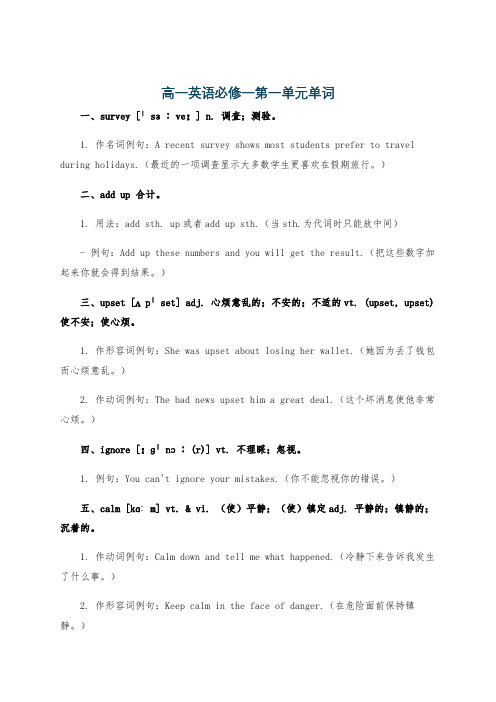
高一英语必修一第一单元单词一、survey [ˈsɜːveɪ] n. 调查;测验。
1. 作名词例句:A recent survey shows most students prefer to travel during holidays.(最近的一项调查显示大多数学生更喜欢在假期旅行。
)二、add up 合计。
1. 用法:add sth. up或者add up sth.(当sth.为代词时只能放中间)- 例句:Add up these numbers and you will get the result.(把这些数字加起来你就会得到结果。
)三、upset [ʌpˈset] adj. 心烦意乱的;不安的;不适的vt. (upset, upset) 使不安;使心烦。
1. 作形容词例句:She was upset about losing her wallet.(她因为丢了钱包而心烦意乱。
)2. 作动词例句:The bad news upset him a great deal.(这个坏消息使他非常心烦。
)四、ignore [ɪɡˈnɔː(r)] vt. 不理睬;忽视。
1. 例句:You can't ignore your mistakes.(你不能忽视你的错误。
)五、calm [kɑːm] vt. & vi. (使)平静;(使)镇定adj. 平静的;镇静的;沉着的。
1. 作动词例句:Calm down and tell me what happened.(冷静下来告诉我发生了什么事。
)2. 作形容词例句:Keep calm in the face of danger.(在危险面前保持镇静。
)六、calm(…)down (使)平静下来;(使)镇定下来。
1. 例句:The mother tried to calm her crying baby down.(母亲试图使她哭泣的婴儿平静下来。
高一英语必修一第一单元重点语法及知识点

高一英语必修一第一单元重点语法及知识点以下是人教版高一英语必修一第一单元重点语法及知识点:- 重点词汇和短语:- add up- upset- ignore- calm down- have got to- concern- go through- set down- a series of- on purpose- in order to- at dusk- face to face- no longer- settle- suffer- recover- get/be tired of- pack- get along with- fall in love- disagree- join in- 重点句型:- It was the first time in a year and a half that I had seen the night face to face.- I wonder if it’s because I haven’t been able to be outdoors for so long that I’ve grown so crazy about everything to do with nature.- I stayed awake on purpose until half past eleven one evening in order to have a good look at the moon for once by myself.- If you have some trouble getting along with your friends, you can write to the editor and ask for advice.- Add up your score and see how many points you can get.- What he did has added to our difficulties.- His income adds up to $1000 a month.- It' s no pleasure looking through these any longer because nature is one thing that really must be experienced.- Why is she so concerned about his attitude to her work?- The police asked him to set down what he had seen in a report.- As I was about to go out and search for him, he happened to come in.- Mr. Jones lives alone and often feels lonely.- We tried to calm him down, but he kept crying.- Does he dare (to) go out at night in such stormy weather?- He would go through fire and water for his country.- That country suffered a heavy loss in the flood.- 语法总结:- 直接引语和间接引语(一)- 直接引语:直接引述别人的原话。
人教版高一英语必修一Unit1知识点详解
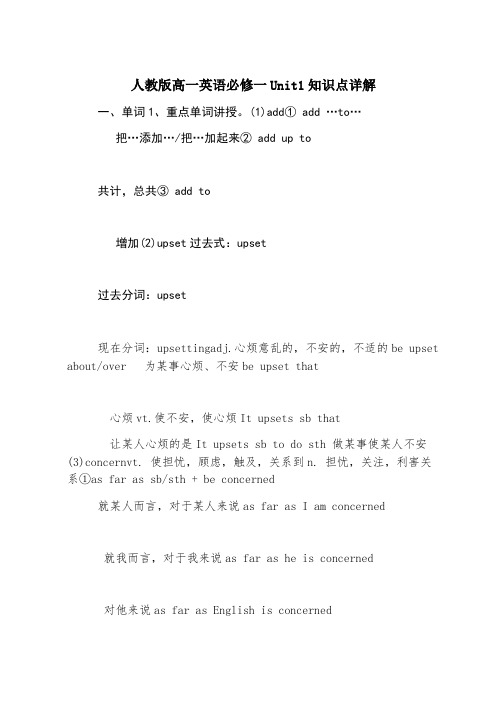
人教版高一英语必修一Unit1知识点详解一、单词1、重点单词讲授。
(1)add① add …to…把…添加…/把…加起来② add up to共计,总共③ add to增加(2)upset过去式:upset过去分词:upset现在分词:upsettingadj.心烦意乱的,不安的,不适的be upset about/over 为某事心烦、不安be upset that心烦vt.使不安,使心烦It upsets sb that让某人心烦的是It upsets sb to do sth 做某事使某人不安(3)concernvt. 使担忧,顾虑,触及,关系到n. 担忧,关注,利害关系①as far as sb/sth + be concerned就某人而言,对于某人来说as far as I am concerned就我而言,对于我来说as far as he is concerned对他来说as far as English is concerned关于英语,对于英语②be concerned about/f or关心,挂念have no concerned about/for③be concernedin/with触及到,与…有关have no concerned in/with(4)go through①经历,遭受,忍受go through one difficulty after another.经历一个又一个困难。
②仔细检查,审查go through your paper 检查你的试卷。
③浏览,翻阅go through all the related reference.浏览相干资料。
④通过,穿过=pass throughgo through a great forest.穿过一片大森林。
⑤完成go through the task.完成任务。
(5)suffer①suffer 作“遭受”时,后面直接接pain, loss, injury, harm或punishment.②suffer 作“受…苦”时,常常搭配:sufferfrom(6)get/be tired of厌烦…get/be/feel tired of sb / sth / doing sth 厌烦be tired from由于…而疲劳(体力上的疲劳),侧重原因be tired out精疲力竭的(7)join in 参加,加入区分join ,join in ,attend 与 take part in:join:多指加入组织,团体,党派等,有作为其中一员的意思。
- 1、下载文档前请自行甄别文档内容的完整性,平台不提供额外的编辑、内容补充、找答案等附加服务。
- 2、"仅部分预览"的文档,不可在线预览部分如存在完整性等问题,可反馈申请退款(可完整预览的文档不适用该条件!)。
- 3、如文档侵犯您的权益,请联系客服反馈,我们会尽快为您处理(人工客服工作时间:9:00-18:30)。
Unit one Friendship
词汇:
1.add up 合计;把…加起来
eg:Add up 3, 4 and 5 and you'll get 12.把3.4.5加起来得12.
Adding these figures up we can find the answer. 把这些数字加起来,我们就
可以找到答数
add up to 总计达;意味着
eg:The bills add up to exactly $100. 这些帐单加起来正好一百元
These evidence really adds up to that he didn't murder the man.这些证据实际上意味着他没杀人
2.upset
adj.心烦意乱的,不安的,不适的
eg:She got upset when she heard this news.听到这个消息她感到不安。
There is no point getting upset about it.犯不着为此烦恼.
vt.使不安,使心烦
eg:The news upset him a lot.这个消息让他很不安。
be upset by sth 被某事困扰
upset oneself about sth 对某事感到不安
3. ignore vt. 不理睬;忽视
eg:You will ignore the bell and go somewhere quiet to calm your friend down,你会不顾上课铃而去一个安静的地方让你的朋友安静下来
ignorant:adj.没有学识的,无知的 ignorance:n.无知
ignore ,neglect,overlook的区别:
ignore:通常指有意不顾或不理会显而易见的事物
neglect:侧重指粗心与疏忽
overlook:指因匆忙而疏忽或视而不见
eg:She saw him coming but she ignored him. 她看见他走过来, 但装做没看到他
He neglected to make repairs in his house.他忘记了修理房子.
The mother overlooked her little boy's bad behavior.那位母亲忽视了她的小儿子的不良行为
3.calm vt/vi.(使)平静;(使)镇定 adj:平静的
eg:No one expected that he was so calm when he heard the bad news. 没人料到他听到这个坏消息还这么平静
Calm yourself. You should not be so excited.请镇静,你不该这么激动。
calm(…) down (使)平静;(使)镇定
eg:I told myself to calm down. 我告诉自己要冷静。
4.have got to 必须;不得不常可以与have to 互换
eg:Have you got to go now?你非得现在走吗?
5.concern vt. (使)担忧;涉及;关系到 n. 担心;关注;(利害)关系
eg:This discussion concerns your brother.这个讨论与你兄弟有关
There is no concern of mine. 这不关我的事
be concerned about 关心,挂念
be concerned at/over sth 为某事忧虑
be concerned in sth 与…有关;参与;牵涉到
6. go through 详细检查;通过,审查,完成;遭受,经历
eg:The country has gone through too many wars.这个国家经历了太多战争。
The new law did not go through.新法案未能通过。
与go 有关的短语:
go back 回去;回顾 go by 从(…)旁边经过;(时间,机会等)过去
go down 下落,降低 go up 上升,上涨,兴建
go into (1) 到达,进入,从事,参加(2)调查,研究,弄清楚
go in for 参加(考试、比赛等);从事;(3) 爱好,喜欢
go out 1) 出去 2)出国,远行 3)熄灭
go over (1) 复习、温习、演习 2)检查,查看
7.set down 记下;放下;登记
eg:I don’t want to set down a series of facts in a diary as most people do.我不愿像大多数人那样在日记中记流水账。
与set 有关的短语:
set about 开始;着手 set off 出发, 动身使爆炸, 点燃, 发射使(某人)开始做, 使发火
set out 出发, 开始;陈述;阐明, 提出(理由) 摆出, 陈列, 布置
set to 认真干起来,大干起来 set up 竖起,建起
8.on purpose 故意(地);有意(地)
purposely (比较正式)故意地
9.in order to do sth 为了做某事可以放在句首,句中;可以与in order that 从句
互换
so as to do sth 为了做某事一般放在句中可以与so that 从句互换
10.face to face 面对面
face-to-face 面对面的
11.no longer=not any longer 不再…
no more=not any more 不再…
二者区别:no longer着重表示时间的不再延续,意为"如今不再"。
no more着重表示数量或程度的减少,意为"再也没有更多(大)的数量(程度)"。
no longer修饰延续性动词,如teach, live, work等,表示动作不再延续;no more修饰非延续性动词,如come, go , make (the same mistake)等,表示动作不再次发生。
12. settle vi安居,停留vt.使定居;安排;解决
eg:He settled his child in a corner of the compartment.他把孩子安顿在车厢的一个角落里.
The family has settled in Canada.这家人已经在加拿大定居。
phrases: settle down 1)(使)停止讲话,(使)安静下来;2)安顿,定居;3)开始专心于(活动、工作等),着手认真做(某事)[+to] settle for (勉强)接受,(将就着)同意
13.suffer v 遭受,忍受;经历
suffer from 遭受,患病 suffer for 因…而吃苦头
eg:Do you often suffer from headaches?你常头痛吗?
You will suffer for it if you drink up all the beer.如果喝完这所有的啤酒你会因此难受的。
14.get/be tired of 对…厌烦
15.pack up 将…包装
pack away将…收起来
eg:Please pack away the picnic things. 请把野餐用的东西收起来
16.
17.get along/on with 与…相处;进展
get along/on well/nicely/badly with 与…相处得好/不好;进展顺利/不顺利18.fall in love with sb与…相爱,爱上…
be in love with 与…相爱,爱着…
前者强调动作,后者强调状态
19.disagree vi 不同意
disagree with sth 不同意某事
disagree with sb (…)使某人身体不适,对某人有影响
disagree about/on 对观点不赞同,有分歧
eg:We disagree on that plan.我们对那个计划有分歧
Seafood always disagrees with me.我吃海鲜总不舒服
20.join in 参加;加入(某活动)=take part in
join 参加;加入(群体,政党,组织等)
eg:When did you join the Party? 你什么时候入党的?
May I join you for dinner?我能和你们共进晚餐吗?
Would you like to join in the English contest?你想参加英语竞赛吗?
语法:
1.介词with+宾语+宾语补足语。
